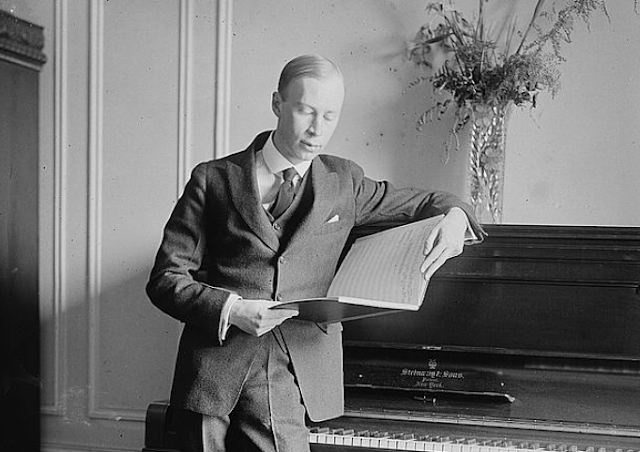 |
| Sergei Prokofiev, in the United States about 1919 |
Farm machinery and opera.
Not two realms that traditionally mix. You’ve got your threshers and combines over there, doing their business, and your sopranos and librettists in a completely different place, doing theirs. Never the twain shall meet.
Yet perhaps the most famous piece of music that ever debuted in Chicago, 100 years ago Thursday, was first performed here and not New York or Paris or Moscow because Chicago was home to the International Harvester Co.
Interested? Well tough, because that’s our topic for today.
On Dec. 30, 1921, the opera “The Love for Three Oranges,” by Sergei Prokofiev, had its world premiere at the Auditorium Theatre.
How did that happen?
Four years earlier, after the overthrow of the czar, the U.S. State Department sent a delegation to Russia to check out the situation. The committee included Cyrus H. McCormick Jr., eldest son of the inventor of the mechanical reaper and president of International Harvester.
In Petrograd, McCormick met the 26-year-old composer. Prokofiev’s name meant nothing to McCormick. But the ambitious musician certainly knew McCormick’s — Prokofiev’s late father had been a manager of large farms.
McCormick was also a governing member of the Chicago Symphony Orchestra and quizzed Prokofiev about who he felt was most worthy of notice on the Russian music scene.
Prokofiev, naturally enough, boosted the most promising young composer he knew: himself. McCormick sent Prokofiev’s published music back to Chicago (along with, to the Russian’s horror, music from lesser composers).
”To go to America!” Prokofiev confided in his diary. “Of course! Here was wretchedness; there life brimming over. Here, slaughter and barbaric rhetoric; there, cultivated life. Here, shabby concerts in Kislovodsk; there, New York, Chicago!”
To continue reading, click here.
"The FBI in Peace and War" was a 1943 book by Frederick Collins, and it chronicled high-profile cases, including the capture of Al Capone. The book gave rise to CBS Radio's drama, "The FBI in Peace and War"...which aired from 1944 to 1958. The program also included stories about the Cold War and about international espionage, at a time when tensions between the U.S. and the Soviet Union were at their highest point.
ReplyDeleteIts unlikely theme song? A march by Soviet-era composer Sergei Prokofiev--from his opera, "The Love for Three Oranges". It was arranged and orchestrated for the series by Amedeo De Filippi. Whenever I hear that march, I immediately think of that radio show, which I listened to as a kid. Hey, what the hell...I'm old!
Its unlikely theme song? A march by Soviet-era composer Sergei Prokofiev from his opera, The Love for Three Oranges, arranged and orchestrated for the series by Amedeo De Filippi.
OOPS...sorry...cut and pasted after composing my reply on a Word document...and didn't scroll down far enough.
DeleteLyric Opera had a jolly production of it some 20 years ago. Wish they would do it again. It's not staged much these days, but the march is something of a symphonic staple. Lyric also was one of the few companies that put on his even stranger "The Flaming Angels."
ReplyDeleteOne of my mother's uncles was a high school classmate of Ben Hecht's in Racine Wisconsin -- before he went to Chicago and got into the newspaper game. His autobiography, "A Child of the Century" is an interesting read. Doesn't come across as a particularly nice man, but some kind of a creative genius. As a Hollywood script writer in his post-journalistic days, he left his mark on many screen classics.
Tom
"Interested?"
ReplyDeleteYes, quite. It's a fine, concise, yet wide-ranging look at a rather fascinating incident. Tying together Chicago musical, agricultural, industrial and journalistic history in one piece certainly warrants the spillover to a second page. : ) Of course, ending with a shot at New York is a bonus! I love the detail that Cyrus, Jr. hadn't heard of Prokofiev, but that the composer was quite familiar with the McCormick name.
Might I ask a few questions, NS? Is this adapted from the December 30 entry in your upcoming book? Or was it one of the runners-up for the date, perhaps?
Did you write the caption including "his most famous work, 'The Love for Three Oranges'"? Despite it having been used for the theme of "The FBI in Peace and War", that seems very debatable to me.
Unrelated to the main topic, but prompted by Tom's comment, we happened to watch "Design for Living", adapted for the screen by Ben Hecht, last night on TCM. Uh, we were unimpressed by the screenplay and the movie, though the acting was good. But, boy, he worked on a LOT of movies.